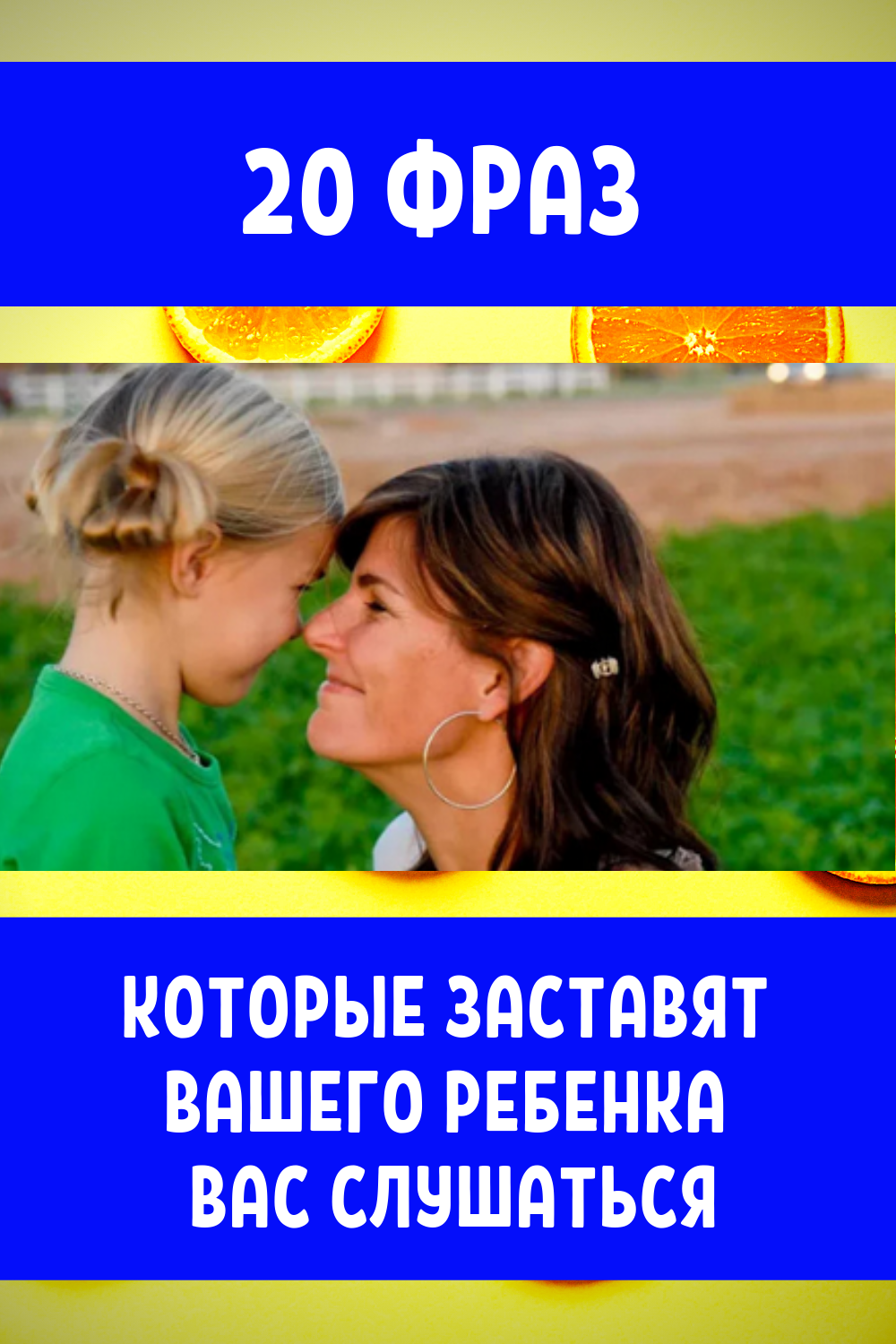20 phrases that will make your child obey you. Yes , patience is needed , but this is better than a scandal! “Replace your judgmental , negative , threatening tone with a neutral , respectful , empathetic , encouraging ( this can take a LOT of time) and your baby’s behavior can improve dramatically. These 20 positive phrases are a great start if you want to change the tone of your communication with your child.
1. "What do you need to remember?"
Remove: "Be careful."
Example: "What do you need to keep in mind when you play in the park?" Or "Please , when you walk on this wall , move slowly , like a careful turtle."
Explanation: Children often ignore phrases that we repeat over and over again. The phrase "be careful" does not carry the right message , so it needs to be spoken more accurately. Voice precautions or convey information about what you want.
2. "Please speak calmly."
 Remove: "Stop screaming!"
Remove: "Stop screaming!"
or "Be calm!" Example: "Please speak quietly or in a whisper" ( say in a whisper) or: "I love your singing but you need to go outside or to the playroom to do it loudly."
Explanation : Some children naturally scream louder than others. Show them where to do it so as not to disturb others , use the power of a whisper to do this. Combined with gentle touch and eye contact , whispering is an incredibly effective way to get kids to listen.
3. "Do you want to do it yourself or do you want help?"
Remove: “I repeat for the third time , get dressed!”
Example: "We're leaving. Will you put on your boots yourself or should I help you?" or “Will you get in the car yourself , or should I help you? »
Explanation: Most children want to be empowered. Give them a choice , and their critical thinking skills will overcome the temptation to balk.
4. “What did this mistake teach you?”
Remove: "Disgrace!"
or "Could have done better." Example: "What did you realize when you did it wrong?" Or “How can I do it differently next time so I don’t get into trouble?”
Explanation: Focusing on the motivation to change behavior for the future will bring you much better results than rebuking for a past act.
5. "Please, …».
 Remove: "Don't!"
Remove: "Don't!"
Or "Stop!" Example: "Please pet the dog gently" or "Please put the shoes in the closet."
Explanation: Do any of us tell the waitress , barista , friends and family about what we DO NOT want? It's easier and faster to say what you want.
6. "Today we must go fast!"
Remove: "Hurry!"
or "We're late!" Example: “Today we are racing cars on the race track! Let's see how fast we can move! "
Explanation: Allow children to be slow! But if you hurry , then it needs to be made interesting for them.
7. “Do you want to leave now or in ten minutes?”
Remove: “Time to go… Already!”
Example: “Guys , do you want to leave now or play another ten minutes and then leave?
Explanation: Children love to be responsible for their own choices! It requires a little attention , but it works! Give them a choice and they will behave better than if you try to force them.
8. "Let's add this toy to our birthday gift list!"
Remove: "We can't afford this" or "No , I said NO TOYS!"
Example: "Let's buy this toy for your birthday?"
Explanation: to be honest , we can often buy this little Lego , we just don't want to buy it. Instead of talking about the lack of money and creating a feeling of scarcity , it is better to teach them to wait for toys or to earn money for them.
9. "Stop , exhale , now ask."
Remove: "Stop whining!"
Example: "Let's stop , breathe together , now try again to ask for what you want."
Explanation: Be sure to simulate this. Keep repeating this calmly until the child calms down and changes his tone.
10. "Respect yourself and others."
Remove: "Be good."
Example: "Don't forget to respect yourself and others , even if you're nervous."
Explanation: be specific because children often fail to grasp general statements. Ask what you want and have them repeat what is important to remember.
11. "Work as a team."
Remove: "Do not command!" and "No one will want to play with you if you do that."
Example: “You are a great leader. Don't forget to use your collaboration skills today. Ask your friends questions , don't tell them what to do."
Clarification: Many children who want to dominate ( or feel powerful) often say that they are bossy or that no one wants to listen to them.
Become your child's coach and teach him fair play. Ask instead of command , show instead of tell , and take turns things .
12. "I need to ...".
Remove: "Stop doing ___" and "It's not okay for ___."
Example: "I need to pet the dog gently." "I need to slow down and move like a turtle since we're in a dangerous parking lot."
Explanation: Statements often don't work and children respond better when we communicate with them in a non-accusatory way. Also , asking for what you want is huge to steer the kids in the direction you want ( as opposed to focusing on what you DON'T want!)
13. "Cry , I sympathize with you."
Remove: "Don't be a baby" or "Don't cry."
Example: "It's okay that you're sad , I'll be here if you need me. I know you can find a way to take care of yourself."
Explained: Babies respond very positively when we don't put pressure on them to stop them crying or try to get them to stop worrying. Teach them that they are able to cope with themselves , and they will quickly stop being sad , and also build their self-esteem.
14. "How will you take care of yourself?"
Remove: “Do this and everything will be fine”, “It doesn’t matter” or “Why are you always upset? Take a cookie."
Example: “Is it okay that you… What can you do to help yourself feel better?
Explanation: The ability of children to take care of themselves is an incredible gift! Children who are able to honestly experience emotions make fewer rash actions , get into fewer troubles and have higher self-esteem.
15. "I'll wait until you're done."
Remove: "Let me do it."
Example: "Looks like you need time , I'll sit down and wait."
Explanation: Parents need to slow down. Let the child tie his shoelaces , or read the inscription. The goal is to let kids try , fail , try again and reinforce their sense of ability so they don't always have to depend on us!
16. "I love you no matter what."
Remove: "No one likes you when you misbehave" or "Don't kiss me after you 've done this. "
Example: "I love you no matter how you behaved. toy next time instead of grabbing it."
Explanation: Positive parenting is based on unconditional love. This means that our love for our children should not depend on their good behavior. We love them with all our heart , no matter what. It satisfies the children's need to belong , which is a key motivating factor.
17. "I'm worried because ...".
Remove: "You're not old enough" or "You're too young to do this."
Example : "I'm worried about you walking up this wall because I'm afraid you 'll fall and hurt yourself."
Explanation: When we have our own fears and worries , our children respond better and respect our limitations. Children often think that they are old enough , strong enough and capable enough. So they speed up the bike or climb the high fence. Remind children of risk using the expression "I'm worried."
18. "Do it yourself."
Remove: "I don't care."
Example: "I would love your help."
Explanation: When we really don't care , this is a great opportunity to empower our kids and let them do things for themselves! Good leaders are also good followers , so let kids make their own decisions sometimes.
19. "I believe in you and support you."
Remove: "I'll take care of it myself" or "Why should I do it for you?"
Example: “I see how difficult this is for you , and I believe that you can handle it. I'm here to support you if you need ideas on how to properly handle the situation."
Explanation: It is important to set our children up for success. They must be able to take care of themselves , solve their problems and be confident that they are capable. Support rather than rescue often requires more patience , but it builds self-esteem and intrinsic motivation in kids!
20. "How do you feel?"
Remove: "Calm down! You don't have to be so upset!"
Example: "I see that you are upset , how do you feel?"
Explanation: Helping children identify their emotions and communicate effectively with them is an important element of positive parenting.
Save so you don't lose
